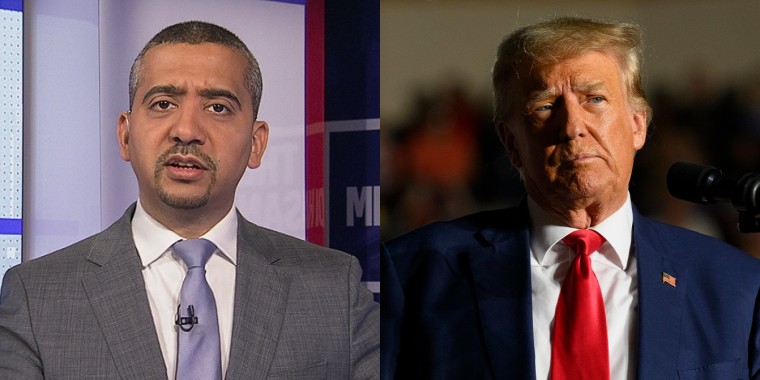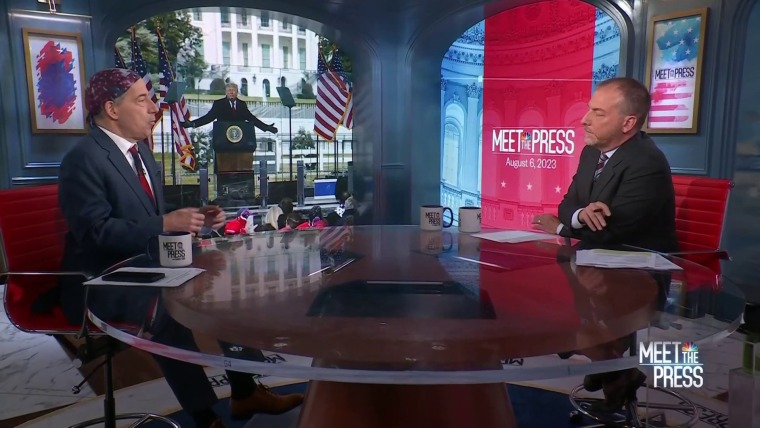Strawmen, whataboutism and straight-up lies. That’s what Donald Trump’s allies seem to be offering in the wake of special counsel Jack Smith’s stunning and damning 45-page indictment of the former president.
Let’s go through Trump’s top five desperate defenses — and debunk them.
1. Free speech
Defenders say Trump had a First Amendment right to say he didn’t lose. On Fox, Greg Gutfeld called the indictment “garbage dressed up with a legal thesaurus … criminalizing speech.”
“You have every right to think an election might be rigged or fixed,” he said.
Gutfeld is correct: You do have a right to think or say the election might be rigged or fixed. Jack Smith agrees. His indictment says: “The defendant had a right, like every American, to speak publicly about the election and even to claim, falsely, that there had been outcome-determinative fraud during the election and that he had won.”
But Smith goes on to note that Trump “pursued unlawful means of discounting legitimate votes and subverting the election results.”
In other words, you can speak freely, as long as you’re not engaged in crimes, or in criminal conspiracies.
Trump is being put on trial not for what he said but for what he did.
2. Fraud? What fraud?
Trump’s defenders have also latched on to the charge of defrauding the United States.
The conservative National Review wrote: “As the Supreme Court reaffirmed just a few weeks ago, fraud in federal criminal law is a scheme to swindle victims out of money or tangible property.”
But the National Review’s editors are wrong. They were referring to “wire fraud,” a different crime.
Trump is charged under 18 U.S.C. 371, which the Supreme Court describes this way:
“To conspire to defraud the United States means primarily to cheat the government out of property or money, but it also means to interfere with or obstruct one of its lawful governmental functions by deceit, craft or trickery.”
3. Politicized justice
Republicans say the indictment is nothing but partisan politics, but what about their take on Hunter Biden?
Republican Sen. Tim Scott of South Carolina tweeted this in response to the indictment:
“I remain concerned about the weaponization of Biden’s DOJ. … What we see today are two different tracks of justice. One for political opponents and another for the son of the current president.”
(As a reminder, until one tried to overturn an election, a Republican president running for re-election had never been indicted before.)
Attorney General Merrick Garland outsourced the investigation to Smith precisely to avoid the risk of politicization or weaponization.
In fact, Joe Biden isn’t involved in any of the indictment investigations, and won’t even comment on them. And Attorney General Merrick Garland outsourced the investigation to Smith precisely to avoid the risk of politicization or weaponization.
As for Hunter Biden, it was a Trump-appointed attorney, David Weiss, who made the original plea deal that has so upset congressional Republicans.
To paraphrase Bill Barr of all people, you may not like this case, but it’s a legitimate case. It’s not "weaponization."
4. Technical violation
According to Trump’s latest lawyer John Lauro, pressuring Vice President Mike Pence to throw out votes was not a violation of the law.
He claims Trump has committed a mere “technical violation of the Constitution.” This type of violation, he continued, “ is not a violation of criminal law.”
Democratic Rep. Jamie Raskin of Maryland joined “Meet the Press” to rebut Lauro’s “deranged argument.” People have been sent to jail for multiple years for fraudulently entering one vote, Raskin noted. Trump tried to steal an election, and his lawyer’s out there saying, ‘Oh, that’s just a matter of him expressing his First Amendment rights.’”
5. Whataboutism
What about the Democrats?
House Speaker Kevin McCarthy, a Republican, has posed the never-ending question: Didn’t Democrats do the same?
Did they? McCarthy cited Hillary Clinton and the Democratic National Committee, who did certainly complain after losing in 2016. It's true Clinton and Al Gore may have objected to the the results, and even argued they were cheated out of the White House. But they also conceded.
Al Gore was the sitting vice president who counted rival George W. Bush’s Electoral College votes. These Democrats did not try to overturn an election. They did not try to entice the DOJ into making false claims of voter fraud, or submit fake electors and attempt to throw out votes via Mike Pence.
What about the fact that no president, and no political party, has ever done what Donald Trump did?
The fact of the matter is Trump is being prosecuted for what he did, not for what he said. And the constant cycle of dishonest, false arguments is evidence enough that this time his actions are legally catching up to him.
This is an adapted excerpt from the August 6 episode of “The Mehdi Hasan Show.”


